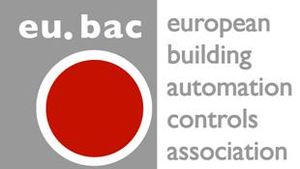eu.bac
| European Building Automation and Controls Association (eu.bac) |
|
|---|---|

|
|
| Seat | Brussels |
| founding | 2003
|
| president | Jean-Yves Blanc |
| executive Director | Peter Hug |
| Branch | London, Paris and Frankfurt |
| Website | www.eubac.org |
eu.bac - European Building Automation and Controls Association is a European association of manufacturers and providers of home automation, building automation and energy services for buildings; the 28 member companies represent around 85% of the corresponding European market. The association was founded in 2003 and is open to all companies that are active in this area. eu.bac has offices in Brussels, London, Paris and Frankfurt. The chairman of eu.bac is Jean-Yves Blanc ( Schneider Electric ).
background
The activities of the member companies concentrate on products and systems in the field of home and building automation, which are used in both residential and commercial buildings. In addition to automatic, performance-efficient control systems, the core business of building automation is information and communication technology for building controls, which can be used to reduce energy consumption through monitoring, control and automation. Energy efficiency is - in addition to comfort for the user - the application goal of building automation.
eu.ESCO is a sub-group of eu.bac that deals with the topic of energy services and energy savings contracting . eu.ESCO is active under its own logo and with its own identity in order to stand out from the core area of eu.bac, which is more in the field of hardware and software for building automation systems.
eu.bac has the European certification system eu.bac Certification for high-quality and energy-saving products in the areas of home and building automation (e.g. electronic heating thermostats, room thermostats, weather-compensated heating controllers (OTC), electronic individual room controllers (IZC), ... ) Developed. In France, this quality mark has been required by the Réglementation Thermique since RT 2005. The supplied cA value for control accuracy is required to determine the building's energy requirement. In addition, eu.bac awards the label for energy-efficient products for home and building automation . This voluntary energy efficiency label complements the European certification program.
For BACS building automation systems , eu.bac has been offering the eu.bac System Audit for energy-efficient and sustainable operation of building automation systems since the beginning of 2013 . The central task of a building automation system is the control and automation of heating, cooling and air conditioning applications including lighting and shading. Well-designed and well-maintained systems not only achieve the desired level of comfort, but also optimize energy consumption at the same time. The energy saving potential and life cycle aspects that can be achieved through building automation are not sufficiently taken into account in today's building certifications , such as LEED , DGNB etc. With the new audit method, eu.bac closes this gap. The procedure is based on existing standards (EN15232, DIN V 18599) and has been scientifically verified by the TU Dresden . With the system audits, planners, investors and property owners save energy and operating costs over the entire life cycle. System audits ensure efficient and sustainable operation.
Building automation systems and devices are standardized in the CEN and ISO groups CEN TC 247 and ISO TC 205 WG 3 (European and international standardization groups).
Eu.bac has been publishing its own magazine since the end of 2014. This is published in three languages: under the title Insight - Insights in English and German, under the title Insight - Découvrir in English and French.
Web links
Individual evidence
- ↑ Homepage of the association. Retrieved February 15, 2015 .
- ↑ Release of eu.bac's first magazine "Insight". Retrieved June 8, 2015 .

